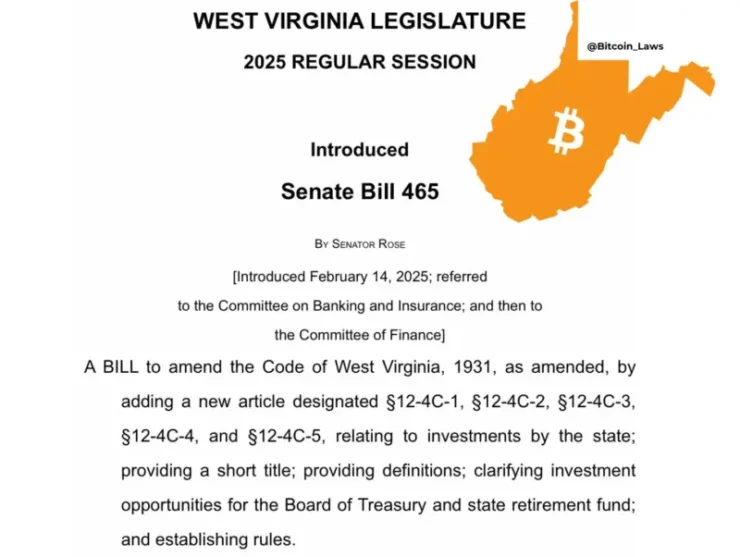West Virginia State Senator Chris Rose has introduced the Inflation Protection Act of 2025, a legislative proposal that would permit the state treasury to allocate a portion of its funds to digital assets and precious metals. Filed on February 14, the bill outlines specific criteria for these investments, limiting digital asset holdings to cryptocurrencies with a market capitalization exceeding $750 billion.
At present, Bitcoin (BTC) is the only cryptocurrency meeting this requirement, though stablecoins are also included in the proposal. The legislation aims to diversify the state’s financial reserves and mitigate inflationary risks through strategic asset allocation.
West Virginia Bill Proposes 10% State Treasury Allocation to Crypto and Gold

The bill allows the state treasury to invest up to 10% of its total holdings in digital assets and precious metals. These investments could be managed through direct holdings on-chain or via exchange-traded funds (ETFs).
Senator Rose’s proposal reflects a growing trend among U.S. states exploring Bitcoin and digital asset reserves as a hedge against inflation and fiscal deficits. This movement follows a national push for digital asset adoption. On January 23, former U.S. President Donald Trump commissioned a working group to assess the feasibility of a federal digital asset reserve, prompting a wave of similar initiatives at the state level.
Several states have already advanced comparable measures. On February 6, the Utah House of Representatives passed a bill permitting state treasury investments in Bitcoin, select altcoins, and stablecoins, which is now under consideration in the Utah Senate. The same day, Kentucky introduced a bill allowing up to 10% of state funds to be invested in digital assets, including Bitcoin. Meanwhile, Michigan representatives Bryan Posthumus and Ron Robinson proposed a digital asset reserve on February 13 without imposing restrictions on asset types.
Growing State-Level Interest in Bitcoin Reserves
Other states have also taken steps toward integrating Bitcoin into their financial strategies. Texas lawmakers reintroduced a bill earlier this week aimed at establishing a state-run Bitcoin reserve, expanding its scope to include additional digital assets meeting specified criteria.
Florida Republican Senator Joe Gruters put forth a similar bill advocating for Bitcoin and other digital assets as a hedge against inflation. Arizona’s respective bills have advanced beyond the House committee stage, and North Carolina recently introduced legislation permitting state investments in Bitcoin exchange-traded products. In contrast, North Dakota opted against moving forward with a similar proposal.
Additionally, the broader digital asset market has seen increased institutional adoption. U.S. spot Bitcoin ETFs experienced strong inflows of nearly $5 billion in January, with Bitwise CIO Matt Hougan predicting potential growth to $50 billion or more by year-end. The surge in Bitcoin-related financial products underscores the growing recognition of digital assets as viable investment vehicles, a factor likely influencing state-level policymaking.





